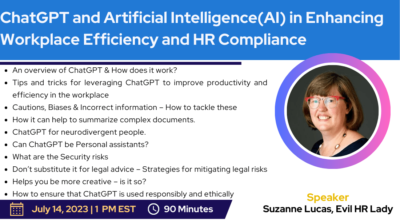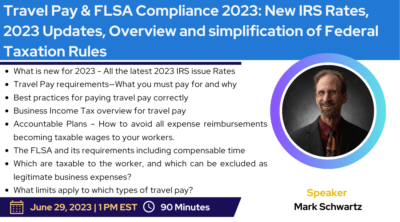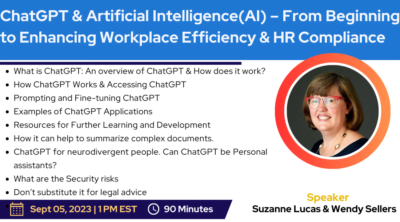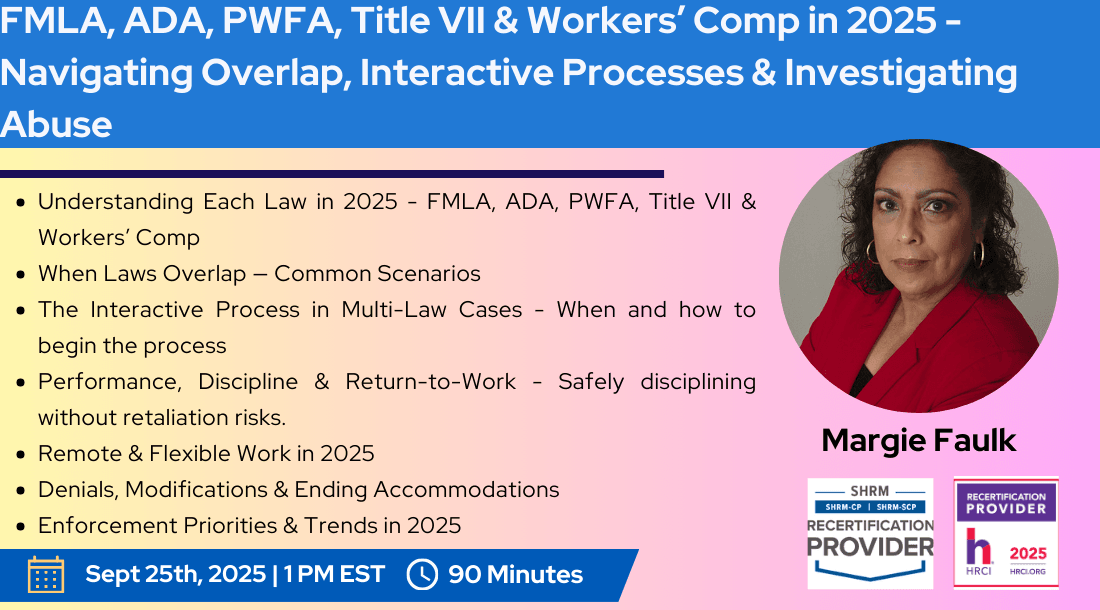Description
HRCI & SHRM Approved Webinar | CEUs = 1.5 Credit Hours
Overview:
When an employee needs time off or requests workplace changes, employers often face a tangled web of compliance obligations. A workplace injury may trigger Workers’ Compensation, but it may also qualify as a serious health condition under FMLA, a disability under ADA, or a pregnancy-related limitation under PWFA. Mishandling these situations can expose employers to claims under Title VII or even retaliation charges.
This training untangles the complexity by showing employers how to navigate the overlap between FMLA, ADA, PWFA, Title VII, and Workers’ Comp — while confidently engaging in the interactive process to stay compliant and avoid costly mistakes.
This webinar will cut through the confusion and provide practical, step-by-step guidance on how employers can remain compliant, avoid lawsuits, and support employees effectively.
Areas Covered in This Training:
- Understanding Each Law in 2025
- FMLA — leave entitlements, eligibility, intermittent leave, medical certification.
- ADA — reasonable accommodations, disability definitions, interactive process.
- PWFA — pregnancy-related accommodations and overlap with ADA/PDA.
- Title VII — discrimination, harassment, and retaliation protections.
- Workers’ Comp — injury-related leave, return-to-work restrictions, wage replacement, and interaction with other laws.
- Defining Key Terms Across Laws
- Disability (ADA vs. PWFA).
- Serious health condition (FMLA).
- Work-related injury (Workers’ Comp).
- Protected classes (Title VII).
- When Laws Overlap — Common Scenarios
- Workplace injury: Workers’ Comp + FMLA + ADA accommodations.
- Pregnancy & childbirth: PWFA + FMLA + Title VII protections.
- Long COVID or mental health issues: ADA accommodations + FMLA leave.
- Religious conflicts: Title VII accommodations + FMLA leave issues.
- Return-to-work restrictions: Workers’ Comp + ADA interactive process.
- The Interactive Process in Multi-Law Cases
- When and how to begin the process.
- Balancing medical documentation from FMLA and Workers’ Comp with ADA/PWFA discussions.
- Avoiding improper or excessive medical inquiries.
- Performance, Discipline & Return-to-Work
- Addressing performance issues when a disability, pregnancy, or injury is disclosed.
- Safely disciplining without retaliation risks.
- Coordinating return-to-work restrictions under Workers’ Comp and ADA.
- Remote & Flexible Work in 2025
- Remote/hybrid as ADA or PWFA accommodations.
- Modified duty assignments under Workers’ Comp.
- Scheduling conflicts and Title VII religious accommodations.
- Denials, Modifications & Ending Accommodations
- When an employer can lawfully deny or modify requests.
- Undue hardship documentation.
- Transitioning employees back from leave or comp benefits.
- Enforcement Priorities & Trends in 2025
- EEOC focus areas: pregnancy, disability, retaliation.
- DOL enforcement of FMLA.
- State workers’ comp agency scrutiny.
- Retaliation as the #1 EEOC charge
- Litigation risks for failing to coordinate overlapping obligations.
Why Attend This Training:
When does a request for leave trigger FMLA? When is an employer required to provide accommodations under ADA or PWFA? How does Title VII’s ban on discrimination intersect with pregnancy, disability, or religious accommodation requests? And what happens when multiple laws apply at once?
- Gain a comprehensive, all-in-one roadmap to FMLA, ADA, PWFA, Title VII, and Workers’ Comp — and overlap.
- Learn how to manage overlapping obligations without violating employee rights.
- Avoid costly mistakes by mastering the interactive process across multiple laws.
- Stay up to date on 2025 enforcement priorities from EEOC, DOL, and workers’ comp boards.
- Build practical strategies for return-to-work, performance management, and accommodations.
Suggested Attendees:
- CEOs & CFOs
- Business Owners
- Small Business Owners
- In-House Counsel & Compliance Officers
- HR Managers, Directors, and Professionals
- Benefits & Leave Administrators
- Department Heads & Supervisors
- Senior Managers responsible for workforce policies














